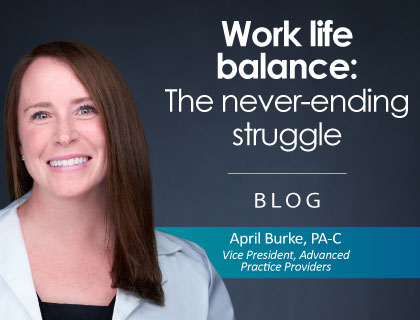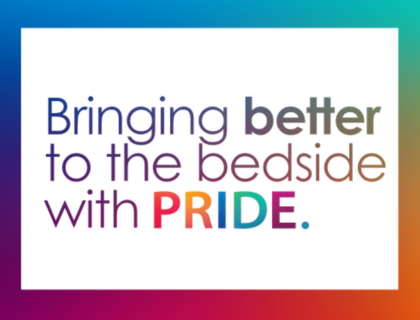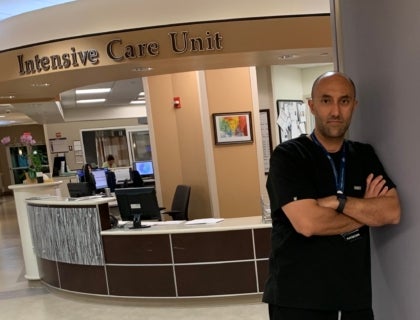March 27, 2024
Trailblazers of diversity: Voices of women advocating for equity – Part 2
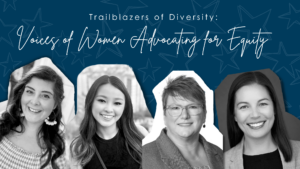 As we celebrate Women’s History Month, we shine a spotlight on the remarkable women within our organization who are not only excelling in their professional roles but are also trailblazing advocates for equity, diversity, and inclusion. In a series of interviews, we explore their unique journeys, challenges faced, and the impactful ways they champion DEI in the workplace.
As we celebrate Women’s History Month, we shine a spotlight on the remarkable women within our organization who are not only excelling in their professional roles but are also trailblazing advocates for equity, diversity, and inclusion. In a series of interviews, we explore their unique journeys, challenges faced, and the impactful ways they champion DEI in the workplace.
From an Asian-American implementations manager breaking barriers to a Vice President of Revenue Cycle embracing diverse perspectives, each individual in our interviews embodies the spirit of advocacy for equity. Their experiences as mothers, leaders, and professionals add layers to the narrative, showcasing the intersections of gender, culture, and career. As we delve into their stories, a common thread emerges — a commitment to fostering a workplace where everyone’s voice is heard and valued. In this second part of the series, we discuss overcoming challenges, building inclusive teams, navigating bias, and career growth.

Overcoming Challenges
Can you share a specific challenge you’ve faced in promoting diversity and inclusion and how you approached it to drive positive change?
Anni: After I had my first child, I really struggled to return to work full-time. I had always considered myself career-driven and assumed that wouldn’t change after having kids. I was miserable when I returned to work after maternity leave, but we relied on my income, and I feared that taking time off to stay home with my daughter would stall my career trajectory – I felt stuck.
Years earlier, I had been introduced to job sharing and loved the idea of keeping a foot in the workforce while having more time with my young kids. Ultimately, I created a path that allowed me to job share for five years (and through two more babies). My partner and I became the second job share at the Fortune 500 company where we worked, were the first to be promoted into a leadership position, and mentored and supported other women to pursue job shares both within and outside the company. I am incredibly proud of that legacy and believe it helped pave the way for others.
May: Being a first-generation Asian American, it took a lot of work to find a job using my network. Both my parents were working minimum wage jobs supporting 3 kids, and the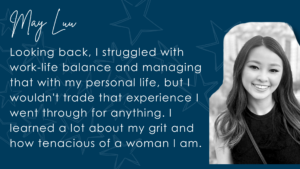 thought of even going to college was a foreign concept. I remember feeling so lost filling out college applications and filling out FAFSA and hoping I wasn’t accidentally committing fraud.
thought of even going to college was a foreign concept. I remember feeling so lost filling out college applications and filling out FAFSA and hoping I wasn’t accidentally committing fraud.
Growing up, it was customary for my parents to be gone 12 hours a day, 7 days a week, so when I got my first corporate job, I thought that was also supposed to be the norm for me. When I started at Sound, I kept working at my college waitressing job after the work day. 9-5 was for Sound, and 5-9 was for waitressing tables.
Looking back, I struggled with work-life balance and managing that with my personal life, but I wouldn’t trade that experience I went through for anything. I learned a lot about my grit and how tenacious of a woman I am.
Robyn: While living in California and working as a consultant, I pursued regular employment with a large provider group in Bakersfield. They had a desire to build an RCM company to not only support their practice but to expand across their professional network. On paper, it was a match made in heaven, with both parties poised to reap significant financial rewards.
In my final meeting, as we wrapped up the verbal terms with a promise of a contract, I was asked, “When do you think you and your husband will be moving to Bakersfield (I was then LA-based)?” I replied that I would not be moving with a husband but rather a wife and we were committed to driving as soon as possible. I noticed a reaction that was attempted to be hidden, but I picked up on it nonetheless. I never heard from them again, not even a courtesy of telling me they decided to go in a different direction. That was when I truly understood how hurtful discrimination really is when you are more than qualified for the opportunity.
Falan: Growing up and in my early career years, I didn’t have many people in my corner rooting for my success. I grew up in extreme poverty. I’ve been homeless more than once, was in and out of the foster care system, and had alcoholic and abusive parents. Despite that, I was determined to define a new sense of normal. I was the first person in my immediate family to graduate high school and college. I was the first person in my family to work in an office, have a formal wedding, and go on vacation out of the country. As a child, some of these things felt unattainable. But I knew I had to redefine what normal looked like so that I didn’t end up in the same place as my parents (who are in a much better place now).
I also recognize that it’s all relative. The hardest thing for me is the hardest thing for me. The hardest thing for someone else is the hardest thing for someone else. We can’t compare trauma or life wins. But we can support each other in life’s lows and celebrate with each other during the highs.
Building Inclusive Teams
In your experience, what strategies have you employed to build and foster inclusive teams, encouraging diverse perspectives and contributions?
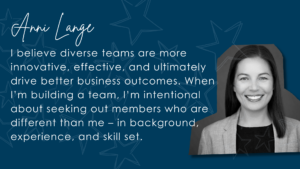 Anni: I believe diverse teams are more innovative, effective, and ultimately drive better business outcomes. When I’m building a team, I’m intentional about seeking out members who are different than me – in background, experience, and skill set.
Anni: I believe diverse teams are more innovative, effective, and ultimately drive better business outcomes. When I’m building a team, I’m intentional about seeking out members who are different than me – in background, experience, and skill set.
May: One of the most crucial aspects of building an inclusive team is encouraging open communication and dialogue. This fosters a sense of belonging and makes each team member feel valued and heard. Also, recognizing and celebrating the diversity within the team and highlighting the unique contributions that each team member brings to the table is equally important.
Robyn: This is where I am spending the most time understanding how to expand dialogue around bias that goes unnoticed and is largely unintentional. Through my DEI training in Alaska, I learned how colloquialisms and slang can be rooted in a history of colonialization and discrimination. These terms represented generational trauma that many communities are still recovering from. What seemed “normal” slang was the opposite, such as Alaskan Natives do not like to be called Eskimos. Being raised in the South, where colloquialisms and slang are as common as Iced Sweet Tea, sparked an interest in exploring the historical roots of Southern vernacular. As a result, I realize that sayings I had never thought about are not appropriate when you understand what they are rooted in. It takes minimal effort to let them go.
From the perspective of gender and identity, I now have my pronouns listed on professional resources and profiles. This creates an awareness of those seeing it, questioning it, and learning why it is essential. It also signifies that I am an ally to someone who may not be aware that I am a member of the LGBTQ+ community.
Falan: Our team has Team Norms that we drafted and adopted together. We review and adjust them annually. The Team Norms allow us to set standards, hold each other accountable, and ensure we foster an inclusive environment. Our Team Norms cover etiquette in how we work with teams and respond to stakeholders so that we’re fair, professional, respectful, and responsive. We also have a “no-judges” rule. I especially appreciate this sentiment when my hair is a hot mess.
Navigating Bias
In our quest for a workplace that values diversity, how do you personally navigate and address bias or stereotypes, fostering an environment where everyone feels seen and respected?
Anni: As a team leader, I’ve realized that my strong personality and results-oriented nature can sometimes overshadow those with less dominant personalities, creating a blind spot. I consciously try to be sensitive to different personalities and work styles to counter this. I strive to create an environment where all colleagues feel acknowledged and respected.
Robyn: The more one understands bias, the better one sees it and addresses it. I have found that most bias is unintentional and out of ignorance. Taking a questioning rather than a critical approach is the most effective. Such as asking, “How could this be interpreted by different audiences” rather than “I think that would be offensive to…”.
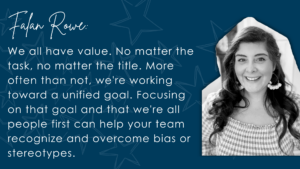
Falan: We all have value. No matter the task, no matter the title. More often than not, we’re working toward a unified goal. Focusing on that goal and that we’re all people first can help your team recognize and overcome bias or stereotypes.
Career Growth
Reflecting on your own experiences, what would you tell your younger self as you started your professional journey?
Anni: Your career is long. Be open to the twists and turns it may take. How I envisioned my career path has evolved with age and more life experience. Some of my richest work experiences have come from taking risks and picking the road less traveled.
We spend a lot of time working, and it’s easy to get wrapped up or lose focus on what’s most important. It’s critical for our mental health and overall well-being to find things outside of work that define and inspire us.
May: I would tell myself to embrace my identity and the unique perspectives and experiences I bring to the table as an Asian American woman. I would also tell myself to stop being afraid to speak up. Every voice matters, as there is a story behind every voice. Those perspectives can bring value to any discussion, meeting, or project.
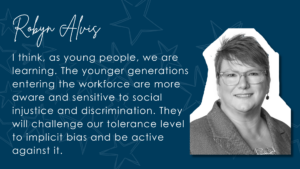 Robyn: I’m not sure I have an excellent answer. I think, as young people, we are learning. The younger generations entering the workforce are more aware and sensitive to social injustice and discrimination. They will challenge our tolerance level to implicit bias and be active against it.
Robyn: I’m not sure I have an excellent answer. I think, as young people, we are learning. The younger generations entering the workforce are more aware and sensitive to social injustice and discrimination. They will challenge our tolerance level to implicit bias and be active against it.
But for me, I guess I would just say, “You don’t know what you don’t know, so assume good intent until proven otherwise.” Have a questioning and curious mind. Be a champion of the underdog, whether for yourself or others, but also be smart about it. Honey attracts more flies than vinegar.”
Falan: Throughout my career, I’ve ascribed to the “fake it till you make it” motto. It’s served me well, except for when it hasn’t. Expect when imposter syndrome thoughts creep in, and I’m forced to remind myself that we all put our pants on one leg at a time. Looking back, I’d still tell myself to fake it till I make it, but I’d also tell myself a few more things.
- Do good work – your work will be associated with who you are, so you should do work you’re proud to attach your name to.
- Leadership is dual in nature – it’s about supporting the mission and helping others succeed, and when you can help others, you should.
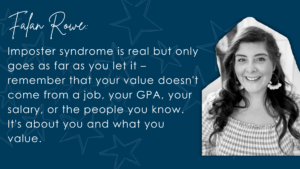
- Imposter syndrome is real but only goes as far as you let it – remember that your value doesn’t come from a job, your GPA, your salary, or the people you know. It’s about you and what you value.
- You can always change – while sometimes doing the best you can is the best you can do, be open to learning and growing. Don’t use “this is just who I am” as an excuse not to support others in the way they need.

